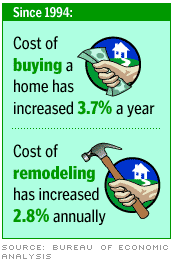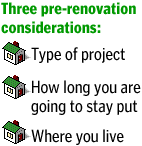
NEW YORK (MONEY) -
The story almost always begins the same: Jane and Joe Homeowner need more space. The value of their three-bedroom 1930s Cape has skyrocketed over the past five years, so they figure it's time to trade up.
They call their Realtor, reel off their wish list (state-of-the-art kitchen, stainless-steel appliances, granite-topped island, attached great room, Jacuzzi in every bath, a master suite with his-and-hers walk-in closets, and no change of schools for the kids) and spend a couple of weekends searching for Shangri-la.
It doesn't take them long to figure out that they have a problem. Their dream home exists, but it's way out of their financial reach.
So they head back home, sit down at their kitchen table and start formulating Plan B. What if they stayed and renovated? What if they made the house they have today into the house they really want? They could build out. They could build up. They wouldn't have to spend $10,000 on a move and 6 percent in brokerage commissions. The kids wouldn't have to leave their friends. And as they run the numbers, they realize they've built up enough equity in their home over the past decade to do what they want.

This scene is playing out so often across the country that the remodeling industry took in a staggering $109 billion from homeowners in 2001. And for good reason: Unlike a stock certificate or Treasury note, your home is an investment you can enjoy.
Quality-of-life improvements are very high on people's lists following Sept. 11. Canton, Ohio, contractor Anna Mavrakis says that back in 1999, if her clients had an extra $15,000, they were likely to spend it on two weeks in Europe. Today they're putting in a media room or a steam shower. "They're cocooning, burrowing in, staying where they're planted," she says. "They've come to realize that $15,000 could buy a heck of a home improvement that they could have for years, not just weeks."
Renovating also makes good economic sense. "House prices have risen faster than the dollar-per-square-foot cost of renovating, which suggests that investing in your home is a very wise thing to do," says Mark Zandi, chief economist at Economy.com.
Of course, not all renovations make sense. One thing on which renovation industry specialists agree is that renovating just to improve resale value is not wise -- in part because you can't be sure of getting your money back. If your intention is to fix 'er up one month to flip 'er the next, there are plenty of contractors who want no part of it. Concord, N.C., contractor Tom Pruitt is one of them. "Soon-to-be sellers," he gripes, "want to do everything on the cheap."
| |
 Related Links
Related Links
| |
| | |
| | |
|
Besides, renovating -- as anyone who's done it will tell you -- is too much of a hassle to go through for anyone's benefit but your own. In April 2001, when she started planning to redo her two bathrooms, Queens, N.Y., mother of two Leslie Weinberg thought she'd be finished by fall. But every decision took months.
In early March of this year, she was sitting in her living room surrounded by 25 boxes of ceramic tile. She was still waiting for two special-order toilets to be delivered. And she hadn't even settled on a contractor. "I've had four or five different guys in to give me estimates," she says. "One said it would cost $14,000 or $15,000 for each bathroom. Another guy was $5,000 less. I'd go with the cheaper one, but I want to make sure that this stuff is being done to code. It becomes a nightmare."
As we see it, there are two -- and only two -- reasons to put yourself through a renovation. First, you want to love where you live. And second, as economist Gopal Ahluwalia of the National Association of Home Builders explains, unless you maintain your property, it will deteriorate.
You have to redo kitchens and baths every 15 to 20 years to preserve the value of your investment. You may even have to expand. Houses built in the 1960s had 1 bathroom, a small kitchen and no family room. Today's new homes have three baths, great rooms and master bedrooms you can land a plane in. Mom and Dad may order in, but they want a kitchen where the whole family can sit down to eat. The price of not keeping your home up to date is that it may eventually sell for significantly less than others of the same size. Worse, it may linger on the market for months.
What will pay off?
The question becomes, how much of a renovation is likely to pay off? That depends largely on the answers to the following three questions:
- What is the project? Adding a family room, renovating a kitchen or bath, finishing your basement or turning your master bedroom into a suite are all fairly good bets, with homeowners recouping 70 to 80 percent of their expenditures on average. Why? Because those are the things that the next buyer most consistently wants. Building a home office is not as much of a sure thing. The average payoff is just 54 percent.

- How long are you going to stay put? The average these days is up to 12 years, according to the Census Bureau, compared with 10.5 years during the 1980s. Ohio contractor Mavrakis says she's put $30,000 baths into neighborhoods of $100,000 houses for people who plan on staying put and don't care if they recoup their costs. But that's not the norm. "You always have to consider your exit strategy," advises David Lereah, chief economist of the National Association of Realtors. Like most experts, he says it's not worth renovating at all if you're not planning to stay at least three years. For the short term, a paint job should suffice.
- Where do you live? There are pockets of real estate where any improvement will more than pay for itself in resale value. Take Garden City, N.Y., where you'll recoup 140 percent of the money you sink into redoing a bathroom and 138 percent of what it takes to make over a kitchen, according to estimates compiled by Remodeling magazine. In San Francisco, the numbers are similar. But down the road in Sacramento, you'll get back only 35 percent of the money you sink into a bathroom and 56 percent into a kitchen. In Tulsa, Okla., you'll break even.
Complicating matters, of course, are swings in the real estate market. Boston real estate may be booming today, but predicting tomorrow's home prices is tricky. Economist Brad Inman of HomeGain.com, a home valuation Web site, says that "often people think they can influence market conditions by over-improving their house. But every neighborhood has an affordability threshold. Go over it and you're never going to get your money back."
One thing to remember, says Brian Patchen of the National Association of Home Remodelers, is that the price of any renovation can look like a great value or a screaming rip-off, depending on how much you paid for your home or its current value. That's because, except for the cost of labor, a first-rate kitchen is going to cost roughly the same -- say, $50,000 -- whether it goes into a $200,000 four-bedroom colonial in Milwaukee, Wis., or a $750,000 four-bedroom colonial in Greenwich, Conn. In Milwaukee, that $50,000 represents 25 percent of the price of your home. In Greenwich, just 6.7 percent.
You may choose to do the project whatever the value of your house, particularly if you're planning to stay for 15 to 20 years, but it's a better deal in the more expensive house. Plus, as Patchen points out, someone who buys a $750,000 house expects a higher level of amenities than someone who buys a $200,000 house.

|

